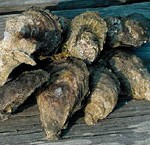Little oysters, big job
October 22, 2015
Maybe you’ve heard the saying, “Pearls before swine,” but you probably haven’t heard “pearls after pollution.”
swine,” but you probably haven’t heard “pearls after pollution.”
According to an article in Pollution Online, New Jersey is looking at employing oysters in their battle against polluted waterways. It turns out these mighty mollusks can help clean up water because they filter water constantly. It’s part of how they search for food, which, in their case, consists of bacteria or microscopic algae known as phytoplankton. According to the story, as the oysters draw in water in an attempt to capture their meal, the “bivalves’ tissues absorb some of the chemicals and pathogens that are present — things like herbicides, pharmaceuticals and flame retardants.”
Apparently, the state has tried it before — but stopped the program after poachers started stealing the oysters and selling them — prompting concerns about diners ending up with potentially pollution-filled oysters as their dinner. Not only could it cause illness, it could have a devastating effect on the fishing industry if consumers fear seafood is going to make them sick.
The program is just in the planning stages, and would be part of a research project to see if “re-establishing oysters in areas like the Raritan Bay” would improve water quality.
The article goes on to quote a report by The Huntsville Times, which stated “there is only so much the tiny creatures can do. “While oysters are known to be one of nature’s best natural filters, new research suggests there are limits to how much pollution they can clean up. In fact, some of the nation’s estuaries are so overwhelmed with excess fertilizer that it would take more oysters than the bays can hold in order to purify the water.”
That’s just one more reason to stop using chemical fertilizers on your lawn and garden.